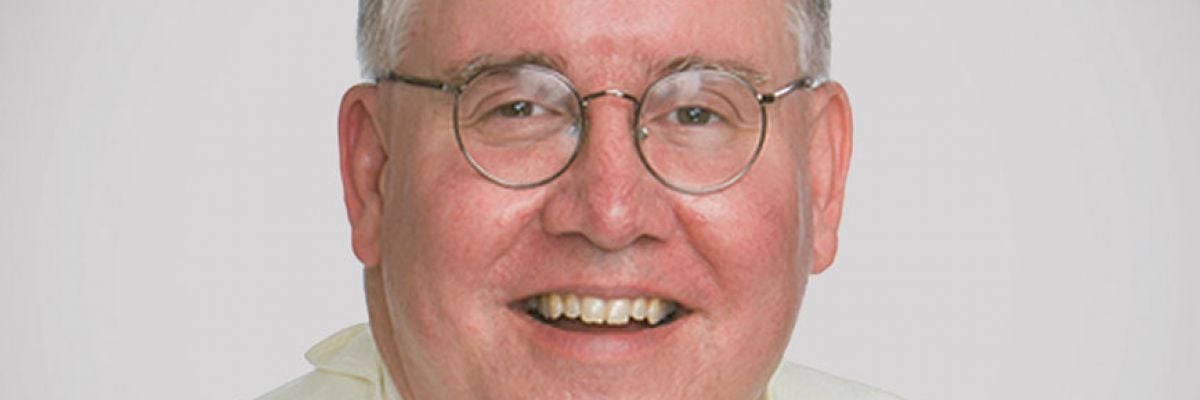
In September, Catholic Answers welcomed our new chaplain, Fr. Hugh Barbour, O. Praem. Fr. Hugh served for twenty-two years as prior of St. Michael’s Abbey, a brilliant beacon of the Catholic Faith in Southern California. When introducing Fr. Hugh to the Catholic Answers staff, President Christopher Check said, “If the Blessed Virgin Mary had appeared to me and asked my first choice for our next chaplain, I would have answered, ‘Fr. Hugh.’ It’s rare to find a keen theological mind, a deep sense of reverence, and a genuine heart for souls in one man, but all three are here in this great priest and dear friend.”
Catholic Answers wishes to extend special thanks to Abbot Eugene Hayes of St. Michael’s Abbey for making possible Fr. Hugh’s assignment as the apostolate’s new chaplain.
Father, what kind of professional preparation do you have for working at Catholic Answers?
My dad, who was an Episcopal priest (and who ended up a Catholic in his retirement), loved to preach and to teach his confirmation classes. I was reared in a home where he was always happy to talk about the creed and the sacraments and Church history. Thus, as a Catholic priest, I naturally have been happy to teach and share the wonderful riches of the Faith with anyone who is interested (and even sometimes with those who were not, at least at first!). Over the years in my abbey, I have taught philosophy from the school of the disciples of St. Thomas Aquinas and St. Augustine and enjoy this more than anything other than celebrating Holy Mass and the Divine Office, which is, of course, a priest’s happiest work.
Until I entered my abbey and began studies in preparation for religious vows and ordination, I had never been in a Catholic school. My education was always secular, so I was used to explaining my Catholic view of the world and of human history. Surprisingly, those around me, teachers and professors and fellow students and friends, were for the most part very open to what I had to say. Often enough I was the only person they knew who spoke from a Catholic perspective. So I guess without knowing it, I was trained by life to be a kind of apologist.
How would you describe Catholic apologetics?
St. Peter tells us, “In your hearts reverence Christ as Lord. Always be prepared to make a defense to any one who calls you to account for the hope that is in you, yet do it with gentleness and reverence” (1 Peter 3:15). There are three principal attitudes at work here: reason, hope, and humility. Everyone who seeks an answer to a question about the Faith we hold is motivated by the hope of laying hold of the truth that saves. The hope of the one answering meets the hope of the one questioning, and they meet on the ground of sound reasoning and humility. This can only be a fruitful and powerful exchange since it is based on the good things that Christ holds out to those who seek him in sincerity of heart.
In the ancient world, apology meant “a reasoned defense.” All of the resources of Catholic teaching are available for such a defense of Christ’s teaching: Sacred Scripture, the Fathers and Doctors of the Church, sacred liturgy, history, philosophical reasoning, rhetorical art, visual art, and music—and, let us not forget, personal, social contact. These are sources that are shot through and through with the deepest of human hopes. When they are brought together in the atmosphere of reverence and humility that the apostle enjoins, they can only move hearts toward a union with the One who said, “I am the Truth.”
St. Augustine teaches that the grace of Christ works principally by attraction, drawing from in front, rather than by efficiency, pushing from behind. This grace, the great doctor teaches, gives a delight the believer finds irresistible. Thus, hope meets up with the love of the One who draws us on. The good apologist hopes to present just enough teaching to the inquirer that he may see and be drawn by this delight in the goodness and beauty and promises of the Savior and so persevere in loving him until death.
To put it simply, apologetics is about saving souls by helping them take delight in the truth. Gaudium de veritate—“joy that comes from the truth”—is a favorite phrase of Augustine. That’s what we’re about.
— Fr. Hugh Barbour, O. Praem
Catholic Answers Chaplain


